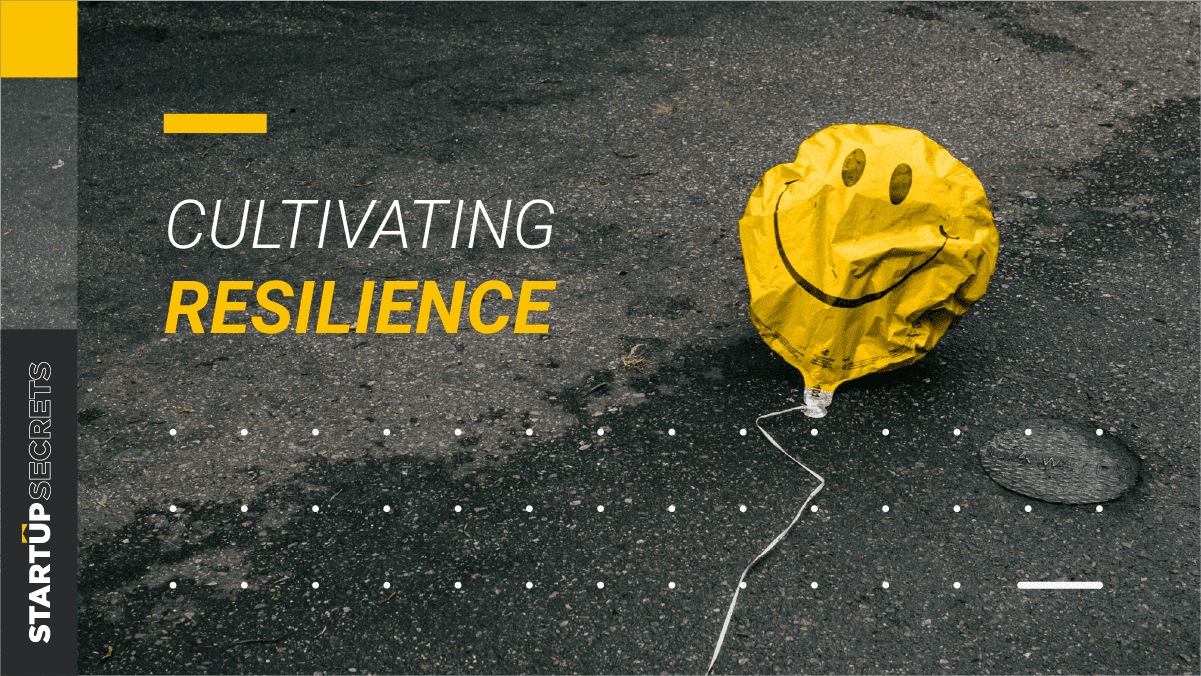OK. You’ve taken those critical first steps needed to keep your business afloat; you got your PPP loan (or you didn’t qualify, or you decided not to apply), and you’ve adjusted expenses to manage your startup’s runway. You now need to move from responding to the immediate impacts of the Covid-19 crisis to leading your company for the long game.
But don’t forget to pause and reflect before you throw your weight into this work. How’s your team? I’m hearing about startup teams that marshaled quickly, but their energy is beginning to falter as things drag on. As a leader, you need to cultivate everyone’s resilience to keep going.
Resilience is the ability to maintain purpose and equilibrium in challenging circumstances. Or, in my own words, the ability to bounce back from disruption.
Either definition will help open up a group conversation. You can unpack it (what’s our purpose, what does equilibrium imply, etc.). And, importantly, you can make clear that it doesn’t suggest we need to be perfect, nor does it mean we weren’t modeling these attributes before things got so hard.
Rather, it’s more like Dory’s motto in Finding Nemo: “Just keep swimming.”
An intriguing alternative definition of resilience is the capacity for stress-related growth. It speaks to the concept of a growth mindset, which I love, and it suggests there is a reward for resilience — you learn and get better at something. That matches up with what psychologists call post-trauma growth.
''An intriguing alternative definition of resilience is the capacity for stress-related growth. It speaks to the concept of a growth mindset and it suggests there is a reward for resilience -- you learn and get better at something.''… Click To TweetLack of resilience is manifested by a sense of helplessness (I can’t do anything), pointlessness (I could do it, but it won’t make a difference), and victimhood or passivity (this is being done to me, this isn’t fair, someone else is going to have to do X first.)
The success of your startup is going to depend on your team’s resilience. To work on building resilience in a group:
1. Talk About It
Take 20 minutes at the top or tail of a regular team meeting and say, “We need a lot of things right now—money, time, etc.—that are hard to come by. But another thing we could really use is resilience. I want to talk about what it is and what it’s not, so we can discuss how to cultivate it in ourselves as leaders.”
Share a definition, then invite comments by asking open-ended questions. “Can you think of a person who seems resilient? How so? Can you think of a time when you felt resilient?”
2. Make It Real For Your Organization
In the following week’s meeting, ask two questions: “What does lack of resilience look like within our team?” And, “What would resilience look like?” Get people to suggest feelings, behaviors, examples, and outcomes; offer a few ideas as prompts if needed.
Ask each team member to respond to both questions, adding something material to the growing pictures rather than just agreeing with what’s been said so far. Collect the answers in a shared document so everyone can see the responses.
Lack of resilience examples include being shut down or checked out; not communicating well; being excessively negative; feeling tense, anxious, or tired; demanding clarity when none is available, and ruminating on the same issues or feelings. If these examples don’t resonate, share a few that do.
Resilience examples include being open to possibilities, adaptive, balanced (“I see that, but I also see…”), resourceful, imaginative, calm, flexible, mindful of purpose, and hopeful. Be sure to point out that it’s not about being happy happy happy all the time, which is unrealistic and is not the goal.
3. Acknowledge Non-Resilient Emotions and Actions
Authentic leaders don’t ignore or overlook how people are really feeling; they acknowledge them. “I feel the same way sometimes.” “I was tempted to say something similar the other day.” “I get that.” Be careful here, though: you don’t want to endorse that thinking.
From there, invite the group to consider the consequences of non-resilient behaviors: nothing changes, we drag others down, we dislike our work, we don’t sleep well, etc.
4. Talk About Cultivating Resilience
There are four realms in which we can act that have been shown to help: physical, emotional, intellectual, and social. Consider asking the group to do some short reading in advance (I’ve listed a few resources at the end of this post), and choose one resilience-cultivating domain to discuss each week.
“Before we wrap up, let’s use our last 10 minutes to talk about how to become more resilient. Last week we talked about physical stamina: getting enough sleep, eating well, etc., and how those build resilience. Today, let’s talk about the mental game.”
5. Inventory Resilience
Ask everyone to monitor and share their resilience each week using a simple scale. “Let’s be honest and put a number on it, where 5 represents the most resilient behavior we can imagine of ourselves, and 0 means, ‘Don’t even ask me to spell the damn word today.’ “I’ll go first: I didn’t sleep well and I skipped yoga this morning to read the news; I’m a 3 at best.”
6. Make Regular Small Commitments to Resilience
You don’t run a marathon by lacing up a new pair of running shoes and tackling the full distance the first time; you train gradually. Likewise, small actions build over time to gradually develop a more resilient outlook.
At the end of each regular group meeting, ask everyone to make one small promise to cultivate resilience in the coming days. “I’m going to catch myself at least once this week after making a negative remark. I’m going to say, ‘That sounded very closed off, sorry. I actually think that might work.’” “I’m giving myself a pep talk each morning, reminding myself of the things I can control.” “I will notice myself feeling like a victim instead of an actor.”
Crises can happen quickly, but they have a very long tail. Clearly we’ll be living with this one for some time to come. The most resilient among us will come out stronger, happier, and smarter — and play a part, however small, in helping the world recover. It’s worth the effort.
– – – – – – –
Recommended Reading
Center for Creative Leadership (CCL) — a long-standing organization helping leaders improve through research, writing, workshops, and webinars — has published a collection of resilience resources.
Harvard Business Review has published a number of articles and podcasts on the broad topic of resilience. Two that I’ve consumed recently:
- Patrick McGinnis’s podcast episode Cultivating Resilience in a Pandemic.
- Rosabeth Moss Kanter’s article Leading Your Team Past the Peak of a Crisis.
This short piece from Psych Central for individuals needing to build emotional resilience.
A British stress management expert on stress resilience skills.
Andrew Zolli’s book Resilience, which is more about building larger systems that can flex through disruption.











